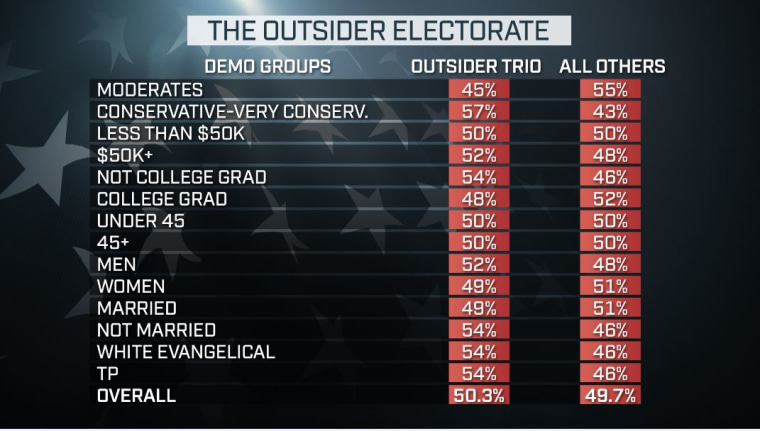There are currently 16 Republicans seeking 2016 presidential nomination, but the easier way to understand the field is by breaking it in two: the three outsider candidates grabbing the poll numbers and attention (Donald Trump, Ben Carson, and Carly Fiorina) and everyone else.
Breaking down the group with that lens reveals just how big the electorate for those outsider candidates is – about 50% of the total GOP primary voters in Iowa and New Hampshire – and gives a sense of the political and demographic contours of the group. A data snapshot shows they are conservative males who earn a decent wage, but do not have a college degree.

We built the above table by combining data from the latest NBC News/Marist polls from Iowa and New Hampshire and looking at it you can see the outsiders (major candidates who have never held elective office) are winning some key primary groups.
Note the large advantage among voters who describe themselves as conservative or very conservative (57% versus 43%). Those voters are generally crucial in Republican nominating contests. In Iowa in 2012, 84% of the caucus voters described themselves as “somewhat” or “very conservative. In New Hampshire the figure was lower, 53%, but still a majority.
And the outsiders lead extends to other subgroups that made up more than 50% of the GOP nominating electorate in those states four years ago, such as men and those making $50,000 or more a year in income.
But beyond the impact the outsiders could have on upcoming nominating contests, these numbers reveal something about the outsiders’ voting coalition and what might be motivating their support. They come from groups that may be feeling greater economic angst than the nation at large and/or feel they are left behind in 2015 America.
For instance, the outsiders are doing better with people who are not college grads. Those people tend feel more uneasy about the nation’s slow recovery – they don’t have a college degree to fall back on.
The outsiders also do better with those who are not married, a group that also tends to feel more exposed in the slow recovery. One person means one income and little margin for error or unemployment.
Other groups that are good territory for the outsider candidates include self-identified tea party supporters and white evangelical voters, groups that object strongly to the general direction of the country.
Put it all together and the rise of the outsiders looks like more than a just a few out-of-the-ordinary candidates getting traction over a lazy summer. Together their supporters look like a big block of Republican voters who are unsettled and uncertain about their prospects and who may be hard for so-called establishment candidates to bring back into the fold.